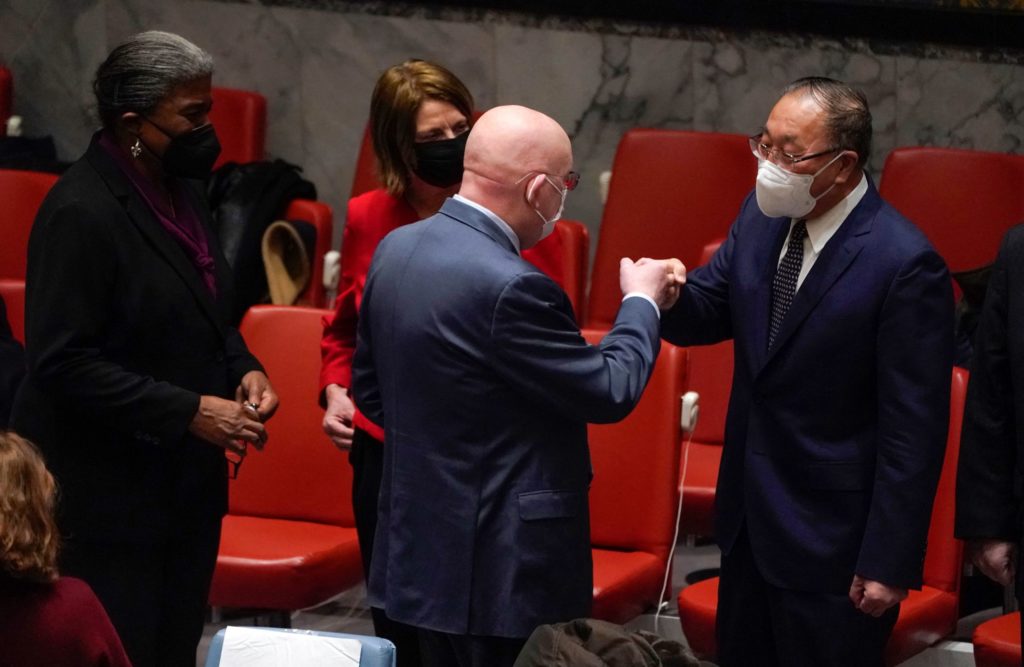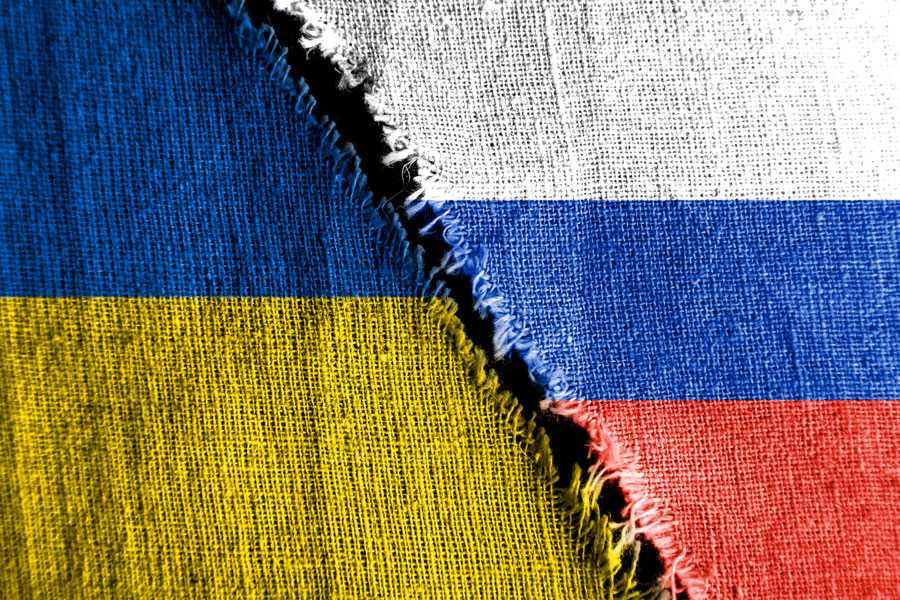Editor’s note: This article is also available in Chinese here. 编者注:本文也有中文版。
Since Russia invaded Ukraine on Feb. 24 in an unambiguous war of aggression, China has attempted to remain on the sidelines. In votes on two Security Council resolutions and a General Assembly resolution, China neither voted with nor against Russia—choosing instead to abstain. China, moreover, has not joined in international sanctions against Russia, providing the outcast country an economic lifeline. That all may be about to change, and with it the serious legal risks that China will be breaking international law and opening itself to sanctions and countermeasures.
According to U.S. officials, Russia has asked China to step off the sidelines—requesting military assistance to support it in its war with Ukraine. Beijing has expressed a willingness to accept the invitation, the Biden administration reportedly told U.S. allies. If Beijing were to go down this path, China could be held legally responsible for supporting Russia’s illegal resort to war as well as international humanitarian law violations committed during hostilities.
Russia’s Manifest Violations of International Law
Russia’s manifestly unlawful conduct is twofold.
First, Russia’s invasion of Ukraine is a clear violation of the UN Charter’s prohibition in Article 2(4) on the “use of force against the territorial integrity or political independence of any state.” It has been condemned as an act of aggression by the General Assembly, and in a statement by members of the International Law Association (English version, Chinese, Russian, Ukrainian). On March 16, 2022, the International Court of Justice decided that Russia’s claims that it was acting to prevent a genocide in Ukraine were baseless and ordered that “the Russian Federation must, pending the final decision in the case, suspend the military operations that it commenced on 24 February 2022 in the territory of Ukraine.” The Court emphasized that its order in this regard has “binding effect” and thus imposes “international legal obligations” on Russia.
Second, Russia has been engaging in violations of international humanitarian law by engaging in what appears to be indiscriminate bombing that killed nearly 600 civilians in the first three weeks of the war, hit at least 43 medical facilities, and involved the use of cluster munitions in dense urban areas. Some of these actions may amount not simply to humanitarian law violations, but war crimes. On March 10, the Prosecutor of the International Criminal Court unveiled arrest warrants against several Russian-supported officials accused of war crimes during the 2008 Russia-Georgia conflict. In doing so he included a significant statement: “My Office has made findings of similar patterns of conduct during its preliminary examination of the Situation in Ukraine.”
China’s Potential Clear Legal Exposure
If China were to provide military assistance to Russia, it would become legally responsible for aiding these violations of international law.
There are three triggers for legal responsibility that China would not be able to avoid. Indeed, we have both analyzed similar legal risks for United States and other States’ military support of the Saudi-led operations in the Yemen war. (See also Brian Finucane’s excellent 2016 article, “Partners and Legal Pitfalls,” which addresses the general topic.)
Article 16 of the Articles on State Responsibility
First, under what is known as the doctrine of state responsibility, States can be held responsible if they knowingly assist another State in breaking international law. Article 16 of the International Law Commission’s Articles of State Responsibility, which is understood to reflect customary international law, provides (Chinese; Russian):
“A State which aids or assists another State in the commission of an internationally wrongful act by the latter is internationally responsible for doing so if: (a) that State does so with knowledge of the circumstances of the internationally wrongful act; and (b) the act would be internationally wrongful if committed by that State.”
It is near certain that the requirement of Article 16 would be met if China were to supply arms or other military assistance to Russia for operations in Ukraine. There has been widespread condemnation of Russia’s invasion as a clear violation of the UN Charter, including by the 141 states that voted in favor of the UN General Assembly resolution denouncing the invasion. Russia’s expected disregard of the International Court of Justice’s order to suspend military operations in Ukraine will be manifest and undeniable. In terms of the humanitarian law violations, there is significant and ever-growing body of public evidence of Russia’s deliberate or reckless disregard for civilians and civilian infrastructure. The UN Charter and humanitarian law violations would be equally unlawful if committed by China, and therefore the situation meets the requirements of subsection (b).
Because the Russian actions are so public and so unambiguously illegal, the decision of China to supply military assistance in support of the war in Ukraine would also meet the more challenging requirements of subsection (a). Indeed, the International Law Commission’s Commentaries provide examples that support the legal standard, including: the General Assembly calling on states to stop “supplying arms and other military assistance to countries found to be committing serious human rights violations” and Iran, in 1984, protesting “the supply of financial and military aid to Iraq by the United Kingdom … on the ground that the assistance was facilitating acts of aggression by Iraq.”
While there is some debate whether Article 16 requires an intent on the part of the assisting State to aid the specific legal violation, resolving that debate is unnecessary in the situation of such repeat and systematic violations (e.g., Russia’s humanitarian law violations in Ukraine) and an ongoing notorious unlawful situation (e.g., Russia’s war of aggression). As Miles Jackson and one of us (Ryan) wrote in 2016:
Even if intent were required, if the assisting State’s knowledge of the circumstances approaches something close to practical certainty that the principal wrong will occur, it may be possible to make an inference of intent. Professor Vaughan Lowe QC argues that “as a matter of general legal principle States must be supposed to intend the foreseeable consequences of their acts.” If this is right, whatever the assisting State’s overall purposes, if it knows that its assistance is significantly contributing to the commission of the principal wrong it may be legally responsible.
Article 41 of the Articles on State Responsibility
Second, under the law of state responsibility, States are strictly prohibited from providing aid or assistance in support of another State’s maintaining a situation that violates peremptory (the highest) legal norms – such as a war of aggression. Article 41 of the ILC’s Articles on State Responsibility, which is understood to reflect customary international law, provides (Chinese; Russian):
Article 41
1. States shall cooperate to bring to an end through lawful means any serious breach within the meaning of article 40 [an obligation arising under a peremptory norm of general international law].
2. No State shall recognize as lawful a situation created by a serious breach within the meaning of article 40, nor render aid or assistance in maintaining that situation.
The rule does not require a showing of intent on the part of the assisting State, as the ILC Commentaries confirm. Furthermore, as a Chatham House report stated, “it could be argued that Article 41 more generally implies that states are under a stricter duty not to render aid or assistance where peremptory norms are invoked, and that the importance of peremptory norms warrants that states should be more careful about the ways in which they cooperate with one another.”
The rule reflected in Article 41 is especially applicable to situations in which States use force as a matter of conquest or to acquire territory, as described in the ILC Commentaries. The ILC also referenced the International Court of Justice’s 1971 Namibia Advisory Opinion, in which the Court not only explicated the rule of non-recognition, but also that UN Member States were “under obligation to refrain from lending any support or any form of assistance to South Africa with reference to its occupation of Namibia.”
China’s provision of military assistance to Russia’s operations in Ukraine would run afoul of the core obligations under Article 41. Indeed, two of the key examples provided by the ILC in explicating State activity that would count as such aid and assistance involved arms embargoes placed by the Security Council on Portugal in 1965 — including for use of military force in colonial territories — and on South Africa in 1977 – including for “acts of aggression against the neighboring States” in the words of the Security Council. The Chinese delegation voted in favor of both resolutions (including a separate vote on the paragraph referring to military supplies to Portugal). The resolution on Portugal was less specific but expansive. It requested States:
“to take all the necessary measures to prevent the sale and supply of arms and military equipment to the Portuguese Government … including the sale and shipment of equipment and materials for the manufacture and maintenance of arms and ammunition to be used in the Territories under Portuguese administration.”
The resolution on South Africa was also expansive and somewhat more detailed. The Council
“[d]ecide[d] that all States shall cease forthwith any provision to South Africa of arms and related material of all types, including the sale or transfer of weapons and ammunition, military vehicles and equipment, paramilitary police equipment, and spare parts for the aforementioned, and shall cease as well the provision of all types of equipment and supplies and grants of licensing arrangements for the manufacture or maintenance of the aforementioned.”
In sum, those are the general and specific terms that China itself helped develop as the law of State responsibility, and it is that law that China would outright violate by providing Russia with military assistance in Russia’s war of aggression in Ukraine.
Common Article 1 of the Geneva Conventions
Third, Common Article 1 of the Geneva Conventions, so called because its verbatim text is common to all four of the Geneva Conventions, obligates states to “undertake to respect and to ensure respect” for the Geneva Conventions in all circumstances. In March 2016, the International Committee of the Red Cross (ICRC) issued new Commentaries on the Geneva Convention, which state that Common Article 1 imposes not only a negative obligation on states not to encourage violations of the law of armed conflict (also known as international humanitarian law), but also (and somewhat more controversially) a positive third-party obligation on states to ensure other States and non-state actors comply with their humanitarian law obligations. For current purposes, it is more than sufficient to rest on the less controversial negative obligation. As the Commentaries state: “Under the negative obligation, High Contracting Parties may neither encourage, nor aid or assist in violations of the Conventions by Parties to a conflict.” Likewise, in both its 1986 Nicaragua judgment and its 2004 Wall Advisory Opinion, the International Court of Justice found that Common Article 1 imposed negative duties “not to encourage” abusess.
By providing weapons to Russia during a war in which there is mounting evidence of violations of international humanitarian law, China would abridge its obligation not to encourage violations of the law of armed conflict. The ICRC explained in terms that would apply to Chinese military assistance to Russian forces in Ukraine: “Financial, material or other support in the knowledge that such support will be used to commit violations of humanitarian law would therefore violate common Article 1.”
We bracket for now two other legal regimes in which Chinese officials personally and China as a State may be held legally responsible for military assistance to Russia’s operations in Ukraine. One regime is international criminal law in which such support can meet the elements for aiding and abetting liability (see each of our prior analysis of U.S. arm sales to Saudi operations in Yemen). Notably, knowledge of the consequences of assistance will suffice for aiding and abetting liability in the case of war crimes and potentially the crime of aggression. The other regime is neutrality law. Under contemporary understandings of neutrality, the legal regime differentiates between aid given to a State acting in self-defense (permissive) versus the one waging a war of aggression (prohibited). China’s support would fall into the latter.
* * *
China may be tempted to support Russia in its conflict with Ukraine. But Beijing should recognize that supplying weapons or other military assistance to the beleaguered country would implicate China directly in Russia’s illegal war and humanitarian law violations. That, in turn, could subject China to economic sanctions and other countermeasures. China cannot provide military aid to Russia and still remain on the legal sidelines.



